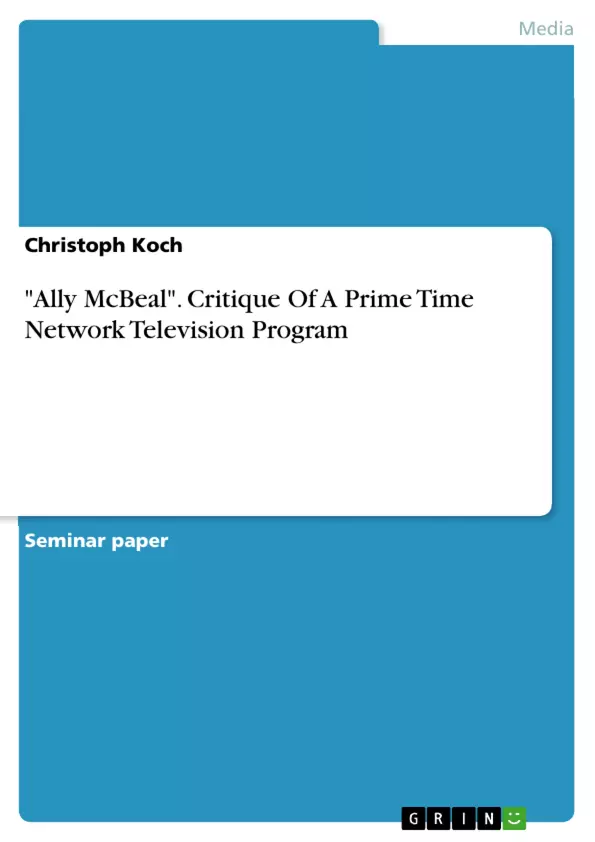If there was one show in the last year almost everybody talked about, it was certainly Fox Network’s new series “Ally McBeal”. The show tells the story of a young woman working for a Boston law firm, trying to be successful in the courtroom as well as in her love life, succeeding in the former rather than the latter. On her first day in the new job for example she finds out that her ex-boyfriend Billy (Gil Bellows) works there as well as his new wife, the smart and beautiful Georgia (Courtney Thorne-Smith of “Melrose Place”). Since Ally (Calista Flockhart) still has feelings for Billy, treating him and Georgia as colleagues of course isn’t quite so easy and the three find themselves in a lot of awkward situations.
Trying to figure out what genre “Ally McBeal” belongs to, is not so easy. On the first look it might appear to be a courtroom drama due to its hour-long format and trials taking place in every episode. But there is also a comedy side to “Ally McBeal”. Her struggle with life is shown in a humorous (often even slapstick) way and other characteristics of a comedy, like “childish behavior of the protagonist” or “lack of experience with the other sex” (Kaminsky 1985, p. 137-139) can be found as well.
Although the show won two Golden Globes in the comedy categories in 1997, “Ally McBeal” should rather be labeled as a “dramedy” due to its mixture of humor and serious issues. The genre of “dramedy” is a combination of drama and comedy and had its (short) heyday during the 1980s when it was praised as a fresh recipe to address an upscale audience. “Ally McBeal” does a very good job in reviving this genre, making its audience laugh as well as reflect or even cry.
Inhaltsverzeichnis (Table of Contents)
- CRITIQUE OF A PRIMETIME NETWORK TELEVISION PROGRAM
- ALLY MCBEAL
- The Genre of "Ally McBeal"
- The Cast
- David E. Kelley, the Producer
- The Image of Women
- The Target Audience
- Personal Opinion
Zielsetzung und Themenschwerpunkte (Objectives and Key Themes)
This critique analyzes the television series "Ally McBeal", examining its genre, character development, production, themes, and audience appeal. The author discusses the show's blend of humor and serious issues, its portrayal of women, and its relevance to a contemporary audience.
- The genre of "dramedy" and its revival in "Ally McBeal"
- The portrayal of female characters and the show's feminist/anti-feminist aspects
- The target audience and the show's appeal to young adults and singles
- The show's realism and its ability to connect with viewers' experiences
- The use of humor, special effects, and music to enhance the narrative and character development
Zusammenfassung der Kapitel (Chapter Summaries)
- The first chapter introduces the premise of "Ally McBeal" and its central character, a young lawyer navigating professional success and personal struggles. The chapter also explores the show's unique blend of comedy and drama, which distinguishes it as a "dramedy."
- The second chapter examines the cast of "Ally McBeal," highlighting the role of Calista Flockhart as Ally and her ability to create a believable and relatable character. The chapter also discusses the individual personalities and dynamics of the supporting characters.
- The third chapter focuses on David E. Kelley, the producer of "Ally McBeal," and his contributions to the show's visual style and editing. The chapter also explores the show's use of music and its influence on fashion trends.
- The fourth chapter delves into the themes surrounding the portrayal of women in "Ally McBeal," examining the show's depiction of female characters as successful professionals and their personal experiences. The chapter also explores the controversy surrounding the show's feminist/anti-feminist elements.
- The fifth chapter examines the target audience of "Ally McBeal," highlighting its appeal to young women and men, particularly singles navigating career and relationship choices. The chapter also discusses the show's relevance to a growing demographic of individuals pursuing their careers before marriage.
Schlüsselwörter (Keywords)
The key themes and concepts explored in this critique include "dramedy," "female characters," "feminism," "audience appeal," "contemporary relevance," "young adults," "singles," "career," "relationships," "humor," "special effects," and "music." The critique also examines the use of visual elements, such as clothing and set design, to enhance the narrative and character development.
Frequently Asked Questions
What genre does "Ally McBeal" belong to?
The show is widely considered a "dramedy," a hybrid genre that blends elements of serious drama with humorous, often slapstick comedy.
Who is the creator of "Ally McBeal"?
The series was produced and created by David E. Kelley, known for his unique visual style and editing techniques.
What is the central theme of the show?
The show follows a young lawyer in Boston as she balances her professional success in the courtroom with her chaotic and often disappointing love life.
Why was the show controversial regarding its image of women?
Critics debated whether Ally's behavior was a realistic portrayal of modern women or an anti-feminist depiction of a successful professional driven by insecurity.
Who was the target audience for "Ally McBeal"?
The show primarily targeted young adults and singles, especially women, who could relate to the struggles of career and dating in the late 90s.
- Arbeit zitieren
- Christoph Koch (Autor:in), 1998, "Ally McBeal". Critique Of A Prime Time Network Television Program, München, GRIN Verlag, https://www.grin.com/document/3939



